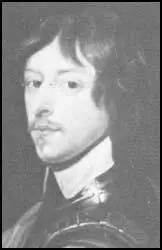George Goring

George Goring, the son of the 1st Earl of Norwich, was born in 1628. When he was 21 he married Lettice Boyle, the daughter of the Earl of Cork. In 1633 his father-in-law bought him a commission as a colonel and fought at the Siege of Breda in 1637.
Goring commanded a regiment for Charles I in the Bishops' War in 1639. The following year he was appointed Governor of Portsmouth.
In 1641 Goring became involved in a conspiracy against Royalist officers and there were suspicions that in any future conflict he would fight for Parliament. However, just before the outbreak of the Civil War he declared for Charles I.
In September 1642 Goring surrendered Portsmouth to Parliamentary forces led by William Waller. Goring now fled to Holland where he assisted Henrietta Maria to buy weapons and to find recruits for the Royalist army. He eventually returned to England and took part in the battle of Seacroft Moor in March 1643. He was captured two months later but after being held at the Tower of London was released in exchange for the Earl of Lothian in April 1644.
In June 1644 Prince Rupert and his Cavaliers set out to rescue the Earl of Newcastle and his forces from the city of York. On 2nd July the Royalists confronted the Parliamentarians at Marston Moor. That afternoon Oliver Cromwell and his forces charged John Byron and his cavalry. His men, instead of pursuing Byron's cavalry, regrouped and returned to protect the infantry that had now come under attack from Goring and his cavalry. His charge was briefly successful and as a result replaced Henry Wilmot as Lieutenant-General of the Cavalry.
Goring's military reputation improved further after his performance at Newbury in October 1644. He was sent to the West Country but while there was involved in a series of disputes with Prince Rupert. Goring, who had a serious drink problem, was defeated by Thomas Fairfax at Langport in July 1645.
In November 1645 Goring went into exile. The following year he joined the Spanish Army of Flanders and took part in the siege of Barclona (1652).
George Goring died in Madrid in 1657.
